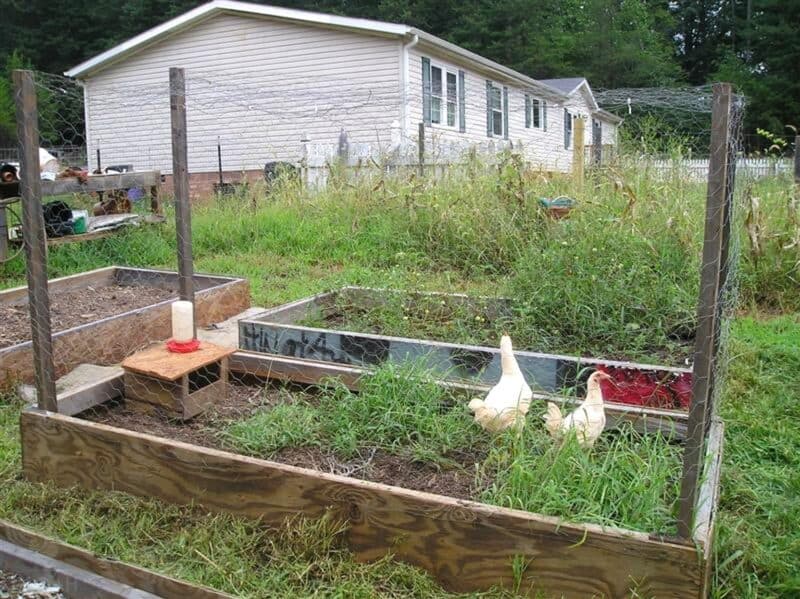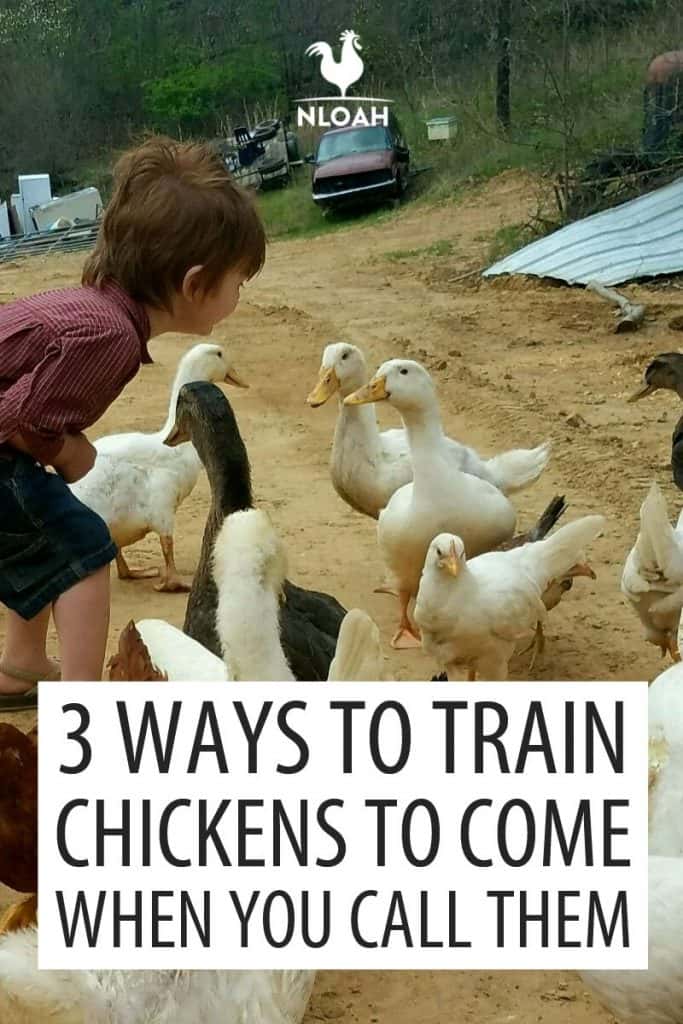Training your chickens to come when you call them might sound impossible, but it really is not that difficult at all. Not only is this homesteading task one of the easier ones you may ever learn how to do, it is an important one, as well.

Teaching your chicken flock to come when you call them helps to build a sense of trust between the poultry birds and the keeper(s) so they run towards and not away from you if they are sick, hurt, or in danger.
If you free range your chickens, having them come when you call them also allows you to be able to conduct a quick headcount to make sure everyone is accounted for before nightly put up.
On our survival homestead I refer to this as the “beak and bill” count since we free range and keep our chickens, ducks, and guineas together.
Part of training the chickens to come when called, at least on our homestead, is to teach them the daily barnyard routine. They learn when it is time to do turnout, put up, egg collection, and when to eagerly line up for the weekly health checks and herb ball treat.
My flock is so well trained that if I am a couple of minutes late they loudly call me to the coup instead of the other way around.
Method #1. The Call
The first, simplest, and most important step of training your chickens to come when you call them is to decide upon what exactly the call will be. The call should be short and always the same words or sounds.
You can use just your voice to utter the call, a whistle, clanging metal triangle, series of claps, a bell, etc.
But, the call should not be something the flock can hear at any other time than when you use it for them or they will quickly become confused during the training, and the call will ultimately be rendered useless.
I just use the same whistling sound that I once made when demanding the attention of students, ballplayers, or my scout troop followed by a loud, “Come on birds.”
Method #2. The Treat
Pick a special treat that will be given to the chickens only when you are training them to come when you call and used as reward for doing so thereafter.
This treat should not be handed out at any other time or once again, the flock will become confused and potentially derail the training.
Choose something that you can cheaply and readily always have stockpiled, not something like apple chunks that you could forget to grab at the store, is only available seasonally on your homestead, and does not have a long shelf life.
Each bird should be given an ample amount of the treat during training, and a decent amount as a reward going forward – so cheap treats are best.
A chicken training treat that can easily be broadcast so the entire flock can spread out at once and immediately best, is ideal.
A treat that has to be hand fed to each bird will take too long to distribute, and will make it hard to determine if every bird got to share in the reward.
Best Treats to Use When Calling Chickens
- Unsalted Sunflower Seeds – unless you grow sunflowers that they can dine upon free choice outside of training when free ranging.
- Pumpkin Seeds
- Mealworms
- Cooked Pasta
- Unsalted Popcorn
- Cracked Corn
- Dried Fruit
If all of the birds don’t get to enjoy the treat during training, the birds get squeezed out of the activity will either stop coming when called or not learn to get with the routine in the first place.
Broadcast the treat over a fairly wide area to ensure each bird gets a fair share, but always make an array of treats close to you and in the same physical location each time. When training chickens to come when called I always conduct the treat reward right outside the door of their chicken run.
Method #3. Routine
Practice the treat and reward training at least once a day when first starting the learning process, but preferably twice.
Initially at least, I believe it is highly helpful to conduct the training sessions at the same time of the day to help the chickens understand what is expected of them, and to connect their beckoning to not only the treat reward but to another permanent activity – such as turn out or put up.
Even though I will not be conducting health checks every time I call my chickens, I do like to handle, or at least touch, all of the birds briefly as they are being trained so that they remain comfortable with my touch, and do not dary away when I reach for them.
Handling the birds often when they are chicks, and continuing to do so will not only help them get comfortable with the practice, but associate the sound of your voice with a feeling of safety – and ultimately food.
Our flock is now so well trained that even the youngest members of our family can call the poultry birds in for a snack.
It is always a sound idea to teach other members of your household to call the chickens in, as well, but the initial training of the birds should be conducted solely by their primary keeper.
Bringing other people into the mix can overwhelm and confuse the poultry birds, and cause delays or obstacles during the training.
Once the flock’s training has been well established you can bring others into the “call, treat and reward” sessions so your chickens, ducks, guineas, and turkeys can learn to obey and be handled by them, as well.
Since we also keep guineas as semi-trained barnyard assassins, we do not need to use the training the chickens received to come when called for predator alerts very often.
But, when a coyote, fox, or bobcat is spotted outside of the guinea coop patrol area, I can use the flock call to quickly beckon the birds in to put them up early so they are protected from the yet undetected threat.
Training your chickens to come when you call them also gives you the ability to sound a warning for them to come home when foul weather is approaching ahead of their regular put up time.
How long it takes you to train your chickens to come when you call will depend on how diligently you can do it on a daily basis.
It took me no more than two weeks – max, to teach my first flock of chickens and ducks to respond to my whistle and the short calling phrase.
Once you train an established flock to follow your commands teaching new additions to follow suit is far simpler.
Chicks hatched to your hens will always follow their mommas, as will recently purchased chickens – and even mature birds will tend to meld in with the rest of the flock so they are not left behind, leaving them feel vulnerable and exposed.
The hours you will spend training your chickens to come when you call them will be well worth the effort.
Chickens trained to respond to you call stand a far better chance of escaping harm from a predator, bad weather since they will run to you and not away when they need help.


Tara lives on a 56 acres farm in the Appalachian Mountains, where she faces homesteading and farming challenges every single day, raising chickens, goats, horses, and tons of vegetables. She’s an expert in all sorts of homesteading skills such as hide tanning, doll making, tree tapping, and many more.
